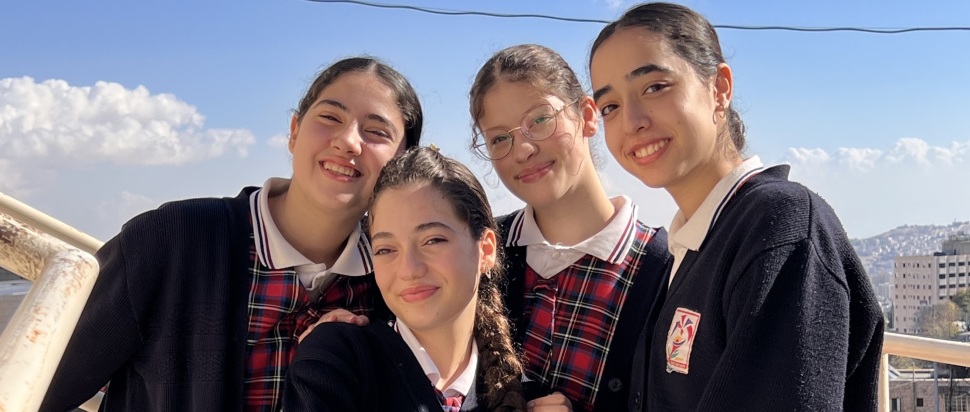West Bank Diaries: Bethlehem Calling at Celtic Connections
Celtic Connections presents Bethlehem Calling, a unique production bringing together theatremakers, audiovisual artist and musicians for a work based on the diaries of teenage girls growing up in the Israeli-occupied West Bank during the second Intifada
When catastrophe arises, one takes immediate control of what is readily accessible to them. The special thing about diaries is that they capture the present moment in all its instantaneity through a first-hand account. This was the case for the girls of St Joseph’s Catholic School in Bethlehem during the Second Intifada and continues to be the case for Palestinians across the nation amidst the year-long genocide of Gaza.
In 2002, the schoolgirls were instructed to write diary entries for their English class. Raeda Ghazaleh, the director of Bethlehem Calling, mentored the girls at the time, encouraging their creative expression by allowing them to enact their diary entries and cultivating – in her words – "a process of expressing themselves and finding their voice[s]" through theatre.
Bethlehem Calling combines theatre and music to bring these diary entries to life, following the girls through their daily thoughts, reflections, experiences, and encounters, performed to the rhythm of the Beit Jala bagpipers. The show’s main performers feature Hana Greer, Yolanda Mitchell, and Aisha Lawal. Live music co-created by Paul Thomson (formerly of Franz Ferdinand) will be performed by musicians including Lewis Cook (Free Love), Chizu Anucha, and Firas Khnaisser.
Ghazaleh tells The Skinny that the primary importance of these diaries is in the girls’ writing processes: "While they’re writing their diaries, they’re analysing their lives and that’s not an easy process… that shows how Palestinian kids are educated." Education is an invaluable cornerstone of Palestinian identity, life, and existence, and the geopolitical and ideological obstacles around it have only strengthened its value to Palestinians. The Palestinian education system has been precisely targeted and debilitated by Israel since 1948, to dismantle and destabilise the physical and literal schools of thought that preserve Palestinian intellect. Bethlehem Calling is an ode to the constant entitlement to, reclamation, and restoration of Palestinian authorship and testimony by younger generations, amidst atrocity.
Bethlehem Calling began as a project which aimed to spotlight the girls’ livelihoods from their perspectives, on their terms. The project has remained true to its roots, loyal to the girls’ accounts of their daily experiences, whether they be frivolous, terrifying, hopeful, or mundane. Ghazaleh and her production partner Zoë Hunter have decided to incorporate the mediums of theatre and music to enact the diary entries and bring a piece of Palestine to the stage. In devoting itself to accentuating the collective Palestinian voice, the project promises to fuse theatre and music in pursuit of a production that encapsulates the creativity and urgency with which the girls’ realities are recorded.
When asked about the connections between the creative and the political, Hunter responded, "If you’re not speaking to an unanswered question, then what are you doing?" This desire to interrogate what is hidden and investigate the voices that are muted is at the heart of the production’s aim. When confronting narratives that have not been fabulised or altered, such as those of these girls, it is our responsibility to ensure that history and contemporary discourse are shaped by that exact witness account, one which Ghazaleh characterises as a testimonial form of "sharing feelings."
Bethlehem Calling guarantees an organic onstage harmony between Palestinian-born lyric and sound. Paul Thomson, the production’s musical director, notes the significance of "getting real-life testimony from people" in Bethlehem while beginning to form the musical foundation for the theatrical production in his "sporadic" style, he tells The Skinny.
Thomson highlights his tendency to work with immediacy, and it is this quality that penetrates the production’s one-of-a-kind internationally polyphonic approach, bringing together local musicians from Scotland to Beit Jala’s very own Scout bagpipers from Palestine. The traditional Scottish instrument has been adopted by Palestinian pipers since the 1920s, who have cultivated a sound on their own merits, in harmony with the vast and nuanced scales indigenous to the region. Thomson notes his eagerness to collaborate with the pipers and co-director Ben Harrison considers this unification to be the "spirit of Celtic Connections."
Ghazaleh prioritises the roots of the Palestinian cause, indicating the problem as untreatable if its origins are left unexamined. She explains that the project’s purpose is to remind the general population that the "horror has not ended." Our responsibility as spectators transcends absorbing these narratives as truths. Rather, we hold the duty of witnessing history, and in Ghazaleh’s words, "thinking, supporting, and wanting to change the reality of it." Hunter asserts that the girls’ "education is being stifled" and they are "desperate to make sure that they’re properly educated," as is the case across the Gaza Strip. Under siege, occupation, and annihilation, the pursuit of education persists.
Palestinian education is especially awe-inspiring, and though obstacles have strengthened its tenacity, these difficulties should not be standardised. These students are storytellers as much as they are students. Born of extraordinary circumstance, these accounts were "written for their own purpose, they weren’t written for us," as Hunter reminds us. The project transports lyric from Palestinian tongue to Scottish soil in such a way that captures the genuine beauty of art produced with the immediacy and urgency of survival attached to it.
Bethlehem Calling: An evening of stories, music and pipers from Palestine, Tramway (Tramway 1), Glasgow, 25 Jan, 7.30pm, part of Celtic Connections
